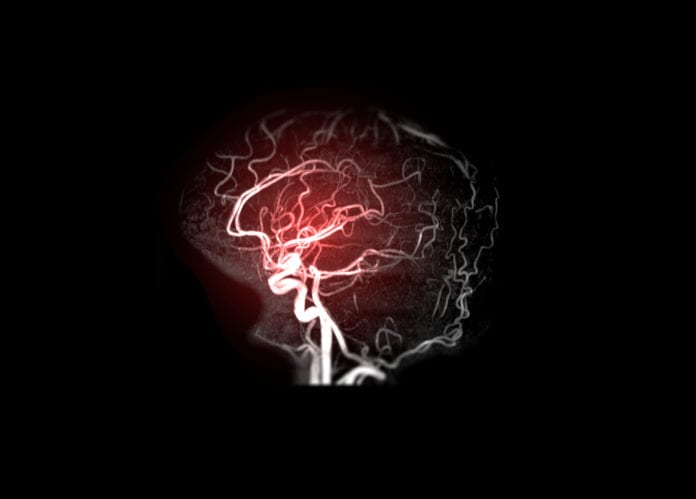Brain aneurysms are often known as “ticking time bombs” — and for a good reason. If they rupture, the consequences can be severe. Most people don’t know that more than one in 50 Americans is currently living with an un-ruptured brain aneurysm; however, many of them will live their life without ever being affected by the aneurysm.
“An aneurysm is a weak spot in the wall of an artery that has ballooned out,” says Daniel Barrow, MD, Rollins professor & chairman and director of the Emory MBNA Stroke Center. “We don’t know why people get them, but we do know that they’re more common in women than men and that about 15 percent of people with aneurysms have a strong family history.”
Brain aneurysm symptoms are also tricky to pinpoint, ranging from no signs at all to the worst headache you’ve ever had. Previously undetected aneurysms are often diagnosed during other illnesses or treatments.
According to Dr. Barrow, between 50-80 percent of us have brain aneurysms that never rupture during our lifetime. It’s difficult to predict when — or if — an aneurysm will rupture. More than 30,000 Americans suffer from a ruptured brain aneurysm each year — and in 40 percent of those cases, the ruptures are fatal.
A Patient’s Journey to Treatment
Working with your doctor to decide which treatment option is best can be challenging. For Patricia Artis, watching and waiting took a significant emotional toll. She placed her trust in Dr. Barrow and his skilled neurosurgery team to determine if and when surgery was necessary. After a few years of watching the aneurysms grow, Dr. Barrow recommended surgery. Patricia successfully underwent brain aneurysm surgery, and four months later, she says it’s “unbelievable” how good she feels.
Treatment Options
If you are diagnosed with an aneurysm, you may or may not need brain surgery right away. “Just because we can treat something doesn’t mean we should treat it — the treatment carries risk,” says Dr. Barrow.
At the Emory Brain Health Center, our specialized neurology and neurosurgery team recommends one of three methods to treat brain aneurysms:
Wait and See — In many cases, patients undergo regular scans to monitor the aneurysm. Our skilled neurologists and neurosurgeons closely watch the aneurysm, making sure it isn’t changing in shape or size. If the aneurysm shows changes between scans, a more aggressive treatment approach could be necessary.
Brain Aneurysm Surgery — An opening is made in the patient’s skull and an operating microscope is used to reach the aneurysm location. A small clip is placed along the base of the aneurysm, blocking blood from entering into the aneurysm. The clip remains in place permanently to cut off all blood access to the aneurysm.
Endovascular Coiling — A catheter is placed in the femoral artery and guided through the body to the artery containing the aneurysm. A microcatheter is then inserted into the aneurysm, releasing soft metal coils (known as Guglielmi Detachable Coils, or GDC). These coils are permanent and will prevent blood from entering into the aneurysm. Endovascular coiling is less invasive in comparison to the brain aneurysm clip surgery. Emory Brain Health Center is a national leader in GDC placement for aneurysm treatment.
If you have been diagnosed with an aneurysm, the experts at Emory Brain Health Center can help you monitor your condition and determine the best treatment option for you.
Learn More
or call 404-778-7777
Your Fantastic Mind
Emory University and the Emory Brain Health Center have partnered with Georgia Public Broadcasting (GPB) on a television series, Your Fantastic Mind, which features compelling stories on brain-related health and wellness.
Your Fantastic Mind will begin airing season 2 in late March 2020 on GPB’s statewide television network. The news magazine-style show highlights patient stories and reports on cutting-edge science and clinical advances in neurology, neurosurgery, psychiatry, sleep medicine and rehabilitation medicine.
Season 1 of Your Fantastic Mind examined topics including sleep apnea, obsessive-compulsive disorder, Alzheimer’s disease, stroke, PTSD, Huntington’s disease, migraines and video gaming disorder, which has been designated a mental health disorder by the World Health Organization.
Jaye Watson is the show’s host, writer and executive producer. She is an Emmy and Edward R. Murrow award-winning veteran Atlanta journalist and video producer for the Emory Brain Health Center.
Emory Brain Health Center
The Emory Brain Health Center uniquely integrates neurology, neurosurgery, psychiatry and behavioral sciences, rehabilitation medicine and sleep medicine and transforms patient-centered care for brain and spinal cord conditions through research and discovery. Bringing these specialties together allows more than 400 researchers and clinicians from different areas to collaborate to predict, prevent, treat or cure devastating diseases and disorders of the brain more rapidly. These collaborations are demonstrated in numerous centers and programs across the Brain Health Center, including the Epilepsy Center, Pituitary Center, Stroke Center, Treatment-Resistant Depression Program and Veterans Program.
Emory’s multidisciplinary approach is transforming the world’s understanding of the vast frontiers of the brain, harnessing imagination and discovery to address 21st century challenges.
Learn more about comprehensive, diagnostic and innovative treatment options at the Emory Brain Health Center.



